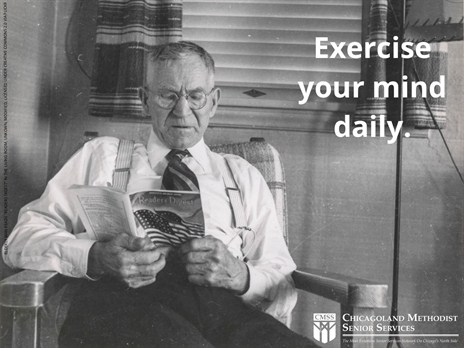
This year, we’re focusing on a number of health resolutions to keep ourselves feeling great throughout 2015. Our first resolution is to strengthen our minds. Below are five tips to help your mind stay sharp throughout 2015 (and beyond)!
1. Exercise
Physical health plays a crucial role in helping our minds stay sharp. While exercising might not sound like the first step to staying mentally fit, it plays an important part in keeping our minds healthy. When we participate in physical activities – whether it be walking, lifting light weights or dancing – more oxygen is sent to our brains while helping reduce the risk for conditions such as cardiovascular disease that can play a role in memory loss.
WebMD recommends getting in 30 minutes of “low to moderate forms of exercise” – such as walking, hiking, or swimming – three times per week.
2. Pick Up a New Hobby
In addition to entertaining you, picking up a new hobby is a great way to stimulate your mind. Hobbies like knitting or painting will help improve fine-motor skills; a hobby like gardening makes use of many of your senses.
Activities must be demanding in order for your brain to stay sharp. In one study, participants who spent 12 weeks learning something they had never done before had better memory than those who engaged in easy mental activities at home.
3. Meditation
Meditation has been proven to not only help improve many ailments, including depression, anxiety and high blood pressure, but it also has the ability to help you focus, improve memory, be more creative and more compassionate. One study that analyzed the autopsies of retired Catholic nuns found that many had Alzheimer’s lesions on their brains, even though they didn’t show any symptoms prior to their death. The study suggests that their ability to remain mentally sharp despite the Alzheimer’s lesions is credited to meditation, a low-fat diet and strong social ties.
4. Read
Reading – along with writing and other brain-stimulating activities – may preserve memory. A study conducted by Emory University found that becoming absorbed in a novel enhances connectivity in the brain and improves brain function. A Rush University Medical Center study found that those who read earlier and later on in life experienced slower memory decline compared to those who didn’t. Another study found that elderly people who regularly read or play mentally challenging games are 2.5 times less likely to have Alzheimer’s.
5. Stay Social
Feelings of loneliness can cause a psychological and cognitive decline, according to a study from the University of Chicago. The University of Rochester Medical Center found that socially active older adults who keep in contact with friends and relatives and participate in group activities are less likely to decline mentally, physically and emotionally as they age. Experts recommend volunteering to help give additional purpose to your life, joining social groups or clubs, and traveling as great ways to remain socially active.
